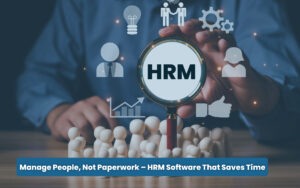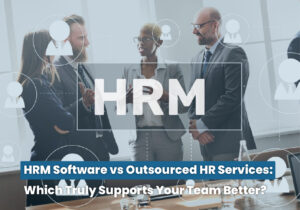Human Resources has always been the heart of every organization. HR teams manage the most valuable asset, people, from hiring and training to managing your staff. But as businesses grow, traditional HR methods become slow, expensive, and error-prone. Modern HRMS solutions are transforming the game, bringing automation, accuracy, and insight like never before.
In this competitive world, HR Efficiency is not just a goal; it’s a survival need. Companies that fail to streamline HR operations risk wasting time, increasing costs, and losing top talent. Let’s explore how smart HR technology is helping organizations achieve HR efficiency while reducing costs and boosting employee satisfaction.
Why Modern Businesses Need Better HR Systems
A few years ago, HR departments were buried under piles of paperwork, employee forms, attendance sheets, and endless approval requests. Even small changes required manual intervention. This old-school system was time-consuming and expensive.
With the introduction of HRMS solutions (Human Resource Management Systems), everything changed. These systems handle repetitive tasks automatically, keep employee information safe, and help managers make quick, data-based decisions. The result is better HR efficiency and fewer mistakes.
Businesses have learned that digital transformation isn’t only about using new technology, it’s about helping HR teams work more efficiently and effectively.
What Exactly Is an HRMS?
An HRMS (Human Resource Management System) is an integrated platform that automates and manages all HR functions in one place, from recruitment to retirement.
It includes modules for attendance, payroll, performance management, recruitment, and even analytics. Think of it as the brain behind modern HR operations, connecting people, processes, and data in a single, seamless workflow.
This centralization increases HR efficiency, improves compliance, and minimizes administrative burden. It’s like having a personal assistant that never sleeps.
How HRMS Solutions Boost HR Efficiency
1. Automated HR Processes Save Time
Manual entry of data and paperwork takes a lot of time, and thus, automated HR processes, such as onboarding, leave approvals, and payroll, lead to employees freeing up HR staff from monotonous tasks.
For instance, when a new employee joins, all onboarding forms, policy acknowledgments, and document submissions can be completed digitally. No more chasing signatures or printing pages , it’s all done in minutes.
This shift drastically enhances HR efficiency and productivity across departments.
2. Payroll Management Solutions Reduce Errors
Payroll errors can damage employee trust and even result in legal issues. A robust payroll management solution calculates salaries, deductions, bonuses, and taxes automatically.
This reduces the chance of mistakes and ensures employees are paid accurately and on time , improving morale and compliance.
For growing businesses, this is a game-changer. What used to take hours of manual checking is now completed with just a few clicks.
3. HR Analytics Turn Data into Decisions
Every HR action generates data, attendance logs, performance reports, recruitment metrics, and more. But data is only valuable if used effectively.
With HR analytics, companies can identify trends, forecast attrition, and measure employee satisfaction. These insights help HR managers make better decisions and plan strategically.
When data replaces guesswork, HR efficiency skyrockets, because every decision is backed by evidence, not assumption.
4. Employee Self-Service Increases Empowerment
Modern employees prefer autonomy. Through employee self-service portals, they can update their information, apply for leave, view payslips, and access company policies, without contacting HR.
This not only reduces the workload on HR staff but also creates transparency and trust among employees.
An empowered workforce means fewer delays, smoother communication, and improved HR efficiency.
5. HR Cost Reduction Through Automation
Every minute saved equals money saved. Automating HR tasks like attendance tracking, recruitment screening, and document management leads to major HR cost reduction.
No need for extra staff to handle manual work or paper-based records. Even printing and storage costs disappear.
The combination of automation and digital record-keeping makes HRMS for businesses one of the smartest investments in today’s competitive market.
Why Every Business Is Moving Its HR to the Cloud
Earlier, companies relied on on-premise systems that required heavy installation and maintenance. Now, cloud HRMS has changed everything.
With cloud technology, HR data is accessible anytime, anywhere, from mobile phones, tablets, or laptops. Managers can approve requests or review analytics on the go.
This flexibility enhances HR efficiency tools and ensures business continuity even when employees are working remotely. Plus, cloud systems offer better scalability and security, perfect for both startups and enterprises.
HR Automation: Turning Tomorrow’s Vision into Today’s Reality
Imagine an HR department that runs almost by itself. Recruitment bots shortlist candidates, attendance logs sync automatically, and performance data updates in real-time.
That’s the power of HR automation.
When combined with a talent management system and performance management software, HR automation creates a unified ecosystem where every process talks to the next.
This means faster workflows, fewer errors, and higher employee satisfaction. In short, a fully automated environment is the foundation of sustainable HR efficiency.
How HRMS Gives Businesses a Real Competitive Advantage
In a highly competitive market, companies are seeing that the management of human resources is not purely a matter of handling documents; it is about performance and retention.
A competent employee management system allows hiring, developing, and keeping the right ones. With features like skill tracking, training modules, and feedback forms, HRMS platforms promote continuous growth.
The companies adopting HR tech solutions are not only getting operational ease but also winning a strategic advantage. They can respond to changes more quickly, make better decisions, and keep HR productivity high even when the market is challenged.
HR Digital Transformation and Integration
HR digital transformation is not about replacing humans; it’s about enhancing human potential through technology.
When HR systems integrate with other business tools (like finance or CRM), companies gain a unified view of data. This HR data integration helps in better forecasting, compliance, and reporting.
Instead of switching between multiple tools, HR teams can manage everything under one platform , boosting HR efficiency and accuracy.
How Modern HR Systems Help You Do More with Less Effort
Optimization means simplifying complex workflows to achieve maximum results with minimum effort.
An HRMS does exactly that by streamlining approvals, minimizing manual inputs, and automating notifications. From attendance to appraisals, every process becomes faster and more consistent.
That’s why HR process optimization is considered a cornerstone of modern HR efficiency , because it transforms HR from an administrative department into a performance powerhouse.
The Role of Performance Management Software
Traditional performance reviews were often biased and irregular. Now, performance management software allows real-time feedback, goal tracking, and continuous improvement.
Managers can set measurable KPIs, track progress, and offer guidance on time. This transparency keeps employees motivated and aligned with company objectives.
As a result, overall productivity increases, further enhancing HR efficiency across teams.
Why Investing in HRMS Pays Off More Than You Think
Many organizations hesitate to invest in HR software due to initial costs. HRMS solutions deliver one of the highest ROIs in business technology.
They reduce paper use, prevent compliance fines, lower administrative overhead, and minimize turnover by improving employee engagement.
Even small businesses can save their time by automating tasks like attendance, payroll, and reports. It’s more than just saving money; it’s smart financial management using HR efficiency tools.
How One Company Transformed Its HR Chaos into Clarity
Consider a mid-sized retail company managing over 500 employees. Before adopting an HRMS, payroll errors were frequent, leave requests piled up, and data tracking was chaotic.
After switching to a cloud HRMS, they automated payroll, launched a self-service portal, and used HR analytics to monitor productivity.
Within six months, administrative time dropped by 40%, compliance issues reduced by 80%, and HR costs went down by 25%.
That’s HR efficiency in action , measurable, sustainable, and transformative.
Building the Future of HR on Data, Empathy, and Innovation
The next phase of HR innovation lies in AI-powered HR technology solutions. Predictive analytics, chatbots for employee queries, and smart dashboards will redefine how HR teams operate.
Soon, every decision, from hiring to training, will be backed by intelligent data insights.
The goal isn’t just efficiency; it’s creating workplaces that are more human, connected, and productive than ever before.
Building a People-First Culture with HR Technology
HR efficiency doesn’t mean using automation; building a culture it’s first priority. Technology like human resource management systems isn’t replacing HR professionals; it’s freeing them. When administrative chaos fades away, HR teams finally have time for what truly matters: mentoring, motivation, and employee well-being.
Modern HRMS solutions make every employee feel seen and supported. Employees feel special when they view their winning progress, manage their schedules, and access training on demand. That sense of empowerment improves productivity, reduces turnover, and strengthens the emotional fabric of the workplace.
The future of HR technology solutions lies in balance, combining automation with empathy. HR can save tasks with a single click. It enhances the efficiency of HR’s tasks. And when that harmony exists, cost-cutting and efficiency naturally follow.
In short, HR efficiency is not just a metric; it’s a mindset. It’s the belief that when technology works for people, people work better for businesses.
How Prismatic Technologies Is Redefining HR Efficiency for Modern Businesses
At Prismatic Technologies, technology should make work simpler, faster, and efficient.
Our HRMS solutions are designed to deliver complete HR efficiency, from automated onboarding to payroll and performance management. Whether you’re a small business or a large enterprise, our cloud HRMS helps you streamline workflows, cut costs, and empower employees through intuitive self-service tools.
We specialize in customizing HR technology solutions that fit your business goals , helping you unlock your team’s full potential.
Let’s make your HR department a powerhouse of productivity and precision.
FAQs
- What is HR Efficiency?
HR Efficiency refers to how effectively an organization manages its HR functions—from recruitment to payroll using minimal time and resources. The higher the efficiency, the better the HR department supports business growth.
- How do HRMS solutions improve HR efficiency?
HRMS solutions automate repetitive tasks like attendance, payroll, and reporting, allowing HR teams to focus on strategy and people development instead of paperwork.
- Can small businesses get benefit from HRMS software?
Absolutely. Even small teams can use HR efficiency tools to reduce errors, save time, and improve employee engagement. Cloud-based systems make it affordable for any business size.
- Is HR automation secure?
Yes. Modern HR automation systems use encryption and cloud security protocols to protect sensitive employee data from unauthorized access.
- How does HRMS help in cutting costs?
By eliminating manual work, reducing paper use, minimizing errors, and improving employee retention, HRMS for businesses results in significant HR cost reduction over time.


